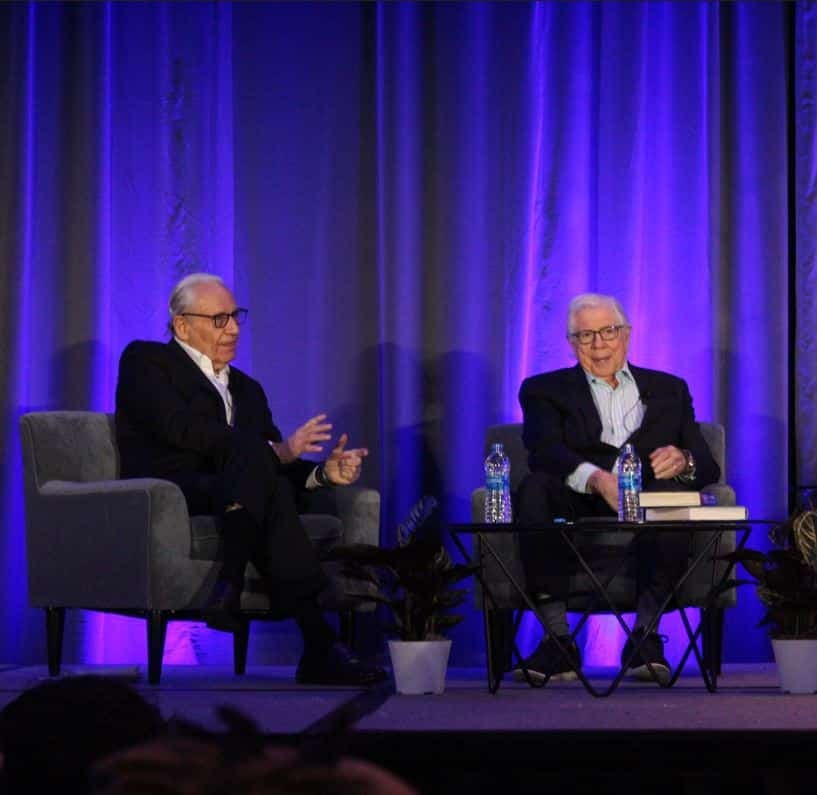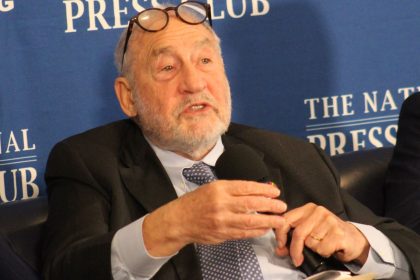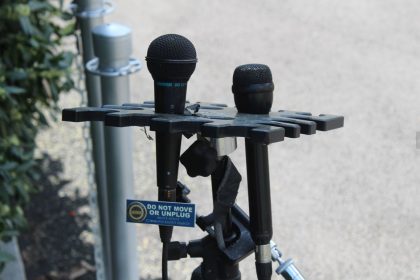Woodward and Bernstein Talk Nixon and Trump at SPJ’s MediaFest22

WASHINGTON — You always can tell when the “rock stars” arrive at any given event.
In this case, the first indication was the growing murmur outside the meeting rooms on the Independence level of the Grand Hyatt hotel.
Almost imperceptible at first to the journalists, college students and other attendees gathered for sessions on photojournalism ethics, making national news local and keeping news alive in small town America, the excitement of the gathering crowd soon overwhelmed the lectures.
By 10:30 a.m., a half hour before the keynote speakers were to arrive, hundreds stood outside the main Independence conference room, waiting to scramble for a precious seat.
Somewhere in the building Bob Woodward and Carl Bernstein, the last true super stars of newspaperdom, were waiting to go on.
The two had been asked to address the more than 800 attendees at MediaFest22, a journalism conference jointly presented by the Society of Professional Journalists, the Associated Collegiate Press and the College Media Association.
Inside the hall, after the doors opened, the anticipation turned electric.
Though most in the room were born two decades or more after Woodward and Bernstein’s dogged coverage of the Watergate break-in and its aftermath led to the resignation of a president, almost all in attendance exhibited a reverence for their work.
“I can’t believe Robert Redford and Dustin Hoffman are actually going to be here,” said one young attendee as he showed off a newly bought copy of “All The President’s Men,” the duo’s book about their reporting of the story that became a movie in 1976.
Redford played Woodward; Hoffman played Bernstein.
A slightly older faculty advisor sitting nearby offered another hot-take:
“It’s almost,” she said, “like seeing a reunion of Simon and Garfunkel.”
As they and others continued to speak among themselves, a slide filled the two large screens positioned on either side of the stage.
About a third of the slide showed a copy of the latest edition of “All the President’s Men,” now affixed with the subtitle “The Greatest Reporting Story of All Time.”
To the right of the book cover, and taking up fully two-thirds of the screen, was a black and white photograph in the midst of the reporting of that story.
They are seated in a diner, side by side, apparently watching something on a distant television screen.
Bernstein appears very much as Hoffman portrayed him on the screen — his dark hair is shoulder-length, his tie is loosened, and his chin is resting in his hand. His gaze, while pensive, is impossible to read.
By contrast, Woodward is pressed and business formal, but he holds his forehead in his left hand. Like Bernstein, his eyes are directed off in the near distance, but his mouth is slightly open, as if he’s about to say something but won’t.
He looks for all the world like a young man trying to take something in while also asking himself, “What does it all mean?”
Fifty years after the string of historic events — and succession of historic stories — that made them journalistic icons, most of the key players in the story are long gone, leaving Woodward and Bernstein to answer the long-familiar questions and to come to terms with what their story means today, in the context of social media, Trump and an insurrection that sought to overturn the results of a legitimate election.
Early on in the proceedings, Woodward recalled how he landed the assignment that would later become Watergate, quite by accident.
“I was asleep,” he admitted.
“I had worked at the Washington Post for nine months, and I loved it so much that I would often go in [on my day’s off] to work on follow up stories,” he said.
“Now, June 17, 1972 was one of the most beautiful days in Washington, ever … when the paper got word of a break-in at National Democratic Headquarters,” he continued. “As I understand it, the editors sat around, asking, ‘Now who on the staff would be dumb enough and come in and work today?’”
The city desk promptly called Woodward and told him to head to the courthouse where the Watergate burglars were due to be arraigned.
Hours earlier the burglars had all been apprehended at the Watergate Hotel office complex. Now, they were all in business suits. When he overheard one of the burglars tell the judge he worked at the CIA, all Woodward could recall saying was “Holy Shit.”
“I was chief Virginia reporter for the Washington Post at the time, dividing my time between Richmond and Washington,” Bernstein said, picking up the thread of the story.
“On this particular day I was in the newsroom doing a story about a candidate running for governor of Virginia when all of a sudden there was a commotion around the city desk, so I walked over to see what was going on.
“Somebody said, ‘There was a break-in overnight at Democratic National Headquarters’ … It seemed like a better story than I was working on, so I said, ‘I’ll make a few calls,’” he said.

While Woodward worked the courthouse angle, Bernstein got busy tracking down the wives of the burglars, most of whom were Cuban and had been living in Florida before their arrests. Speaking what he described as “Pidgin Spanish,” Bernstein was able to confirm that the Cubans too had been on the CIA payroll.
“All of these elements ended up in the first day story, which did not carry our names,” Bernstein said.
The following day, both men were back at work, working the phones, trying to fill in and build on the details they’d gathered for their first story. On the second day they were able to confirm that James McCord, the burglar who had told the judge he worked for the CIA, was also the chief security officer for Nixon’s re-election campaign.
“That’s the day Carl and I both exchanged ‘holy shits,’” Woodward said.
But already, the two reporters had become a team, and Woodward said he had already begun learning important techniques from the colleague he hadn’t previously known very well.
“Right after 9/11, I interviewed the then-new FBI Director, Robert Mueller, and he told me that his order to his team was, whatever you’re investigating, go out and find the people at the lower level, who have day-to-day responsibility, and talk to them. Start from the bottom,” Woodward said.
“That’s exactly what Carl taught me. He said, ‘Look, we can’t go to the Nixon campaign, they’re not going to talk to us,’ ‘We can’t go to the White House.’ ‘We’re not national reporters.’ ‘No one knows us.’ So we’ve got to knock on doors. This was the Bernstein method,” he said.
A break came when it turned out one of the lower level employees they contacted was an old girlfriend of Bernstein’s; as it happened, she had worked for Nixon’s re-election campaign and gave the reporters the organization’s telephone directory.
The list led Bernstein to an assistant to the bookkeeper for the campaign. After being unable to contact her by phone, he showed up at her home and knocked on her door. After some persuasion, he got invited inside.
As it turned out, the source not only knew detailed information about the campaign’s bookkeeping, but also about some of the so-called dirty tricks it was carrying out.
“That’s a lesson for all of today’s journalists,” Woodward said. “We need to show up.”
“Then once I got her talking, I just wanted to keep her talking … so I kept asking for another cup of coffee and I was there, practically all night. … The next day, Woodward and I went back together and we spoke to her again,” Bernstein said.
Bernstein estimated that he and Woodward wrote over 200 stories in the first year and half of the Watergate saga that named not a single source of the information they were reporting.
“That’s because they were all working inside Nixon’s organization; we didn’t talk to a single Democrat in the course of our reporting,” he said.
Throughout it all, both men said, they had the unwavering support of Post Publisher Katherine Graham and their editor, Ben Bradlee.
“And they also had skepticism about us,” Woodward said. “They wanted to make sure we had our story right.”
The biggest moment, and perhaps a moment of reckoning, was when Woodward and Berstein were preparing to run a story saying the by-then former Attorney General John Mitchell had been one of five people with control of a secret slush fund for the Nixon presidential campaign.
They’d run the story by Mitchell, who had lashed out angrily at the reporters. They then sought a quote from the White House and got a response — “The sources of The Washington Post are a fountain of misinformation” — that gave birth to a new phrase in journalism: the “Non-Denial Denial.”
Before the story ran, Bradlee met the reporters near the Post’s coffee machine and made sure they were quoting everything in the story accurately. When the editor was satisfied he walked away, leaving Bernstein to put a dime in the coffee machine.
“That was the moment when a cold chill went down my spine and I first said to myself, ‘Oh my God, the president is going to be impeached.’”
“This was long before anyone was talking about impeachment,” Woodward said. “But I said, ‘Oh my God, you’re right.’ And we right there agreed, we could never use the word ‘impeach’ in a story because it would sound like we had an agenda.”
“There comes a moment, if you’ve done your reporting and done it correctly, that you suddenly understand the dimensions of the story you’re working on. This was that kind of situation,” Bernstein said.
A similar moment happened again to Woodward recently, after he reviewed several hours of tape recordings he’d made with former President Donald Trump while he was working on “Rage,” one of three books he’s written about the Trump presidency.
Initially conducted in the Oval Office beginning in 2019, the series of conversations continued into 2020 with Trump often making surprise phone calls to Woodward at home or on his cellphone.
The conversation, recently released by Woodward as “The Trump Tapes” reveal, among other things, and in Trump’s own voice, that the former president knew the gravity of the coronavirus outbreak long before the American public did and refused to do anything about it.
The reaction has been two-fold. Some accuse Woodward of withholding newsworthy nuggets, keeping them secret and fresh for his book — a charge lately leveled at Maggie Haberman of The New York Times.
Then there’s the response from Trump, who told Fox News he plans to sue Woodward, not because the tapes are inaccurate but because Trump says they belong to him and he needs to be compensated for their sale.
Woodward responded to some of the criticism when talking to MediaFest22 attendees after his and Bernstein’s appearance, saying simply, “I didn’t figure out how crucial to history and understanding Trump they were until I re-listened to them earlier this year.”
Though neither man addressed the commentary surrounding the release of “TheTrump Tapes” on stage, Bernstein lashed into the former president, suggesting he is the fulfillment of fears George Washington expressed in his farewell address to the nation in September 1796.
Washington, Bernstein noted, “said the day may come when an unprincipled man may come to occupy this high office … putting their pursuit of personal and political gain in front of the interests of the American people.”
“This,” Bernstein said, paraphrasing Washington, “Is the weak spot in our democracy; this is the great danger.”
“It was unimaginable to us that anything could surpass what Nixon had done in terms of criminality, in terms of undermining democratic notions … and then along came Donald Trump,” Bernstein continued. “Not just that he was a criminal president, but that he was the first seditious president in our history.”
“I agree with Carl about Trump being a seditious president … But the other thing we discovered when we went back over the tapes was that Trump just does not understand the presidency … and that there is a dimension to his character that is [almost diametrically opposed to what the presidency is about].
“With Trump, it is all about him,” Woodward continued. “In going over the eight hours of tapes we found he literally referred to the good of the people one time, and he referred to himself over 100 times.”
Moderator Claire Regan asked Woodward and Bernstein where the Trump story goes from here.
“Well, first of all, despite what you’ve heard, we don’t have a crystal ball,” Bernstein said. “What we’ve been talking about, and I think this is another phrase that came from covering Watergate, is trying to report ‘The best obtainable version of the truth.’”
“One of the amazing things that has happened and will continue to happen, given what we know about Donald Trump, is that in terms of what is truthful, there are no rules, there are no restraints, there is no untruth that will not be told,” he said.
“I think I was on CNN when I said, referring to Trump, that the president of the United States is a serial liar. And it sounded pejorative. But what I was saying at the time, was what Republicans on Capitol Hill are saying in private. They knew he was a serial liar.
“Fortunately we’ve had this great investigation by the House Jan. 6 Committee and we know where he’s willing to go in terms of elections, including the congressional elections that are underway now,” Bernstein said.
“Trump is on the ballot this year, not in name, but certainly he sees himself as having a stake in the outcome and he’s going to be out campaigning in the coming days for Republicans in Iowa, Pennsylvania, Florida and Ohio,” Woodward said, adding that in Trump he sees a reflection of Nixon in one of his darkest moments.
“Nixon, of course, had the tape machine going in the Oval Office, and on Dec. 18, 1972, he’s heard saying, ‘Remember, we’re going to be around and out live our enemies.”
“And Nixon goes on to say, ‘Never forget, the press is the enemy. The press is the enemy. The press is the enemy. The establishment is the enemy. The professors are the enemy. Professors are the enemy. Write that on the blackboard 100 times and never forget it.’
“Now, that was Richard Nixon 50 years ago, who talks like that today?” Woodward said.
Dan can be reached at [email protected] and at https://twitter.com/DanMcCue.
























